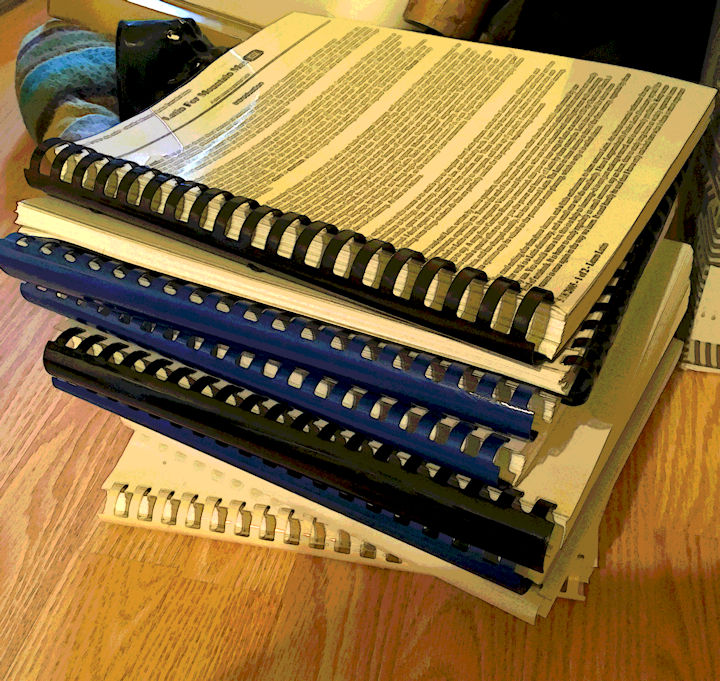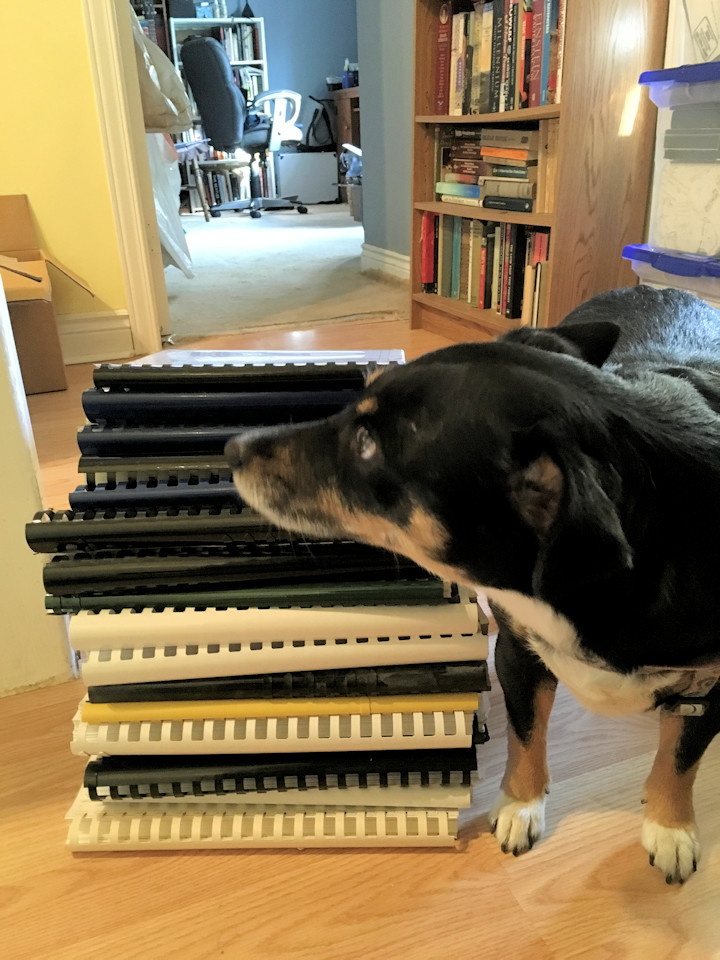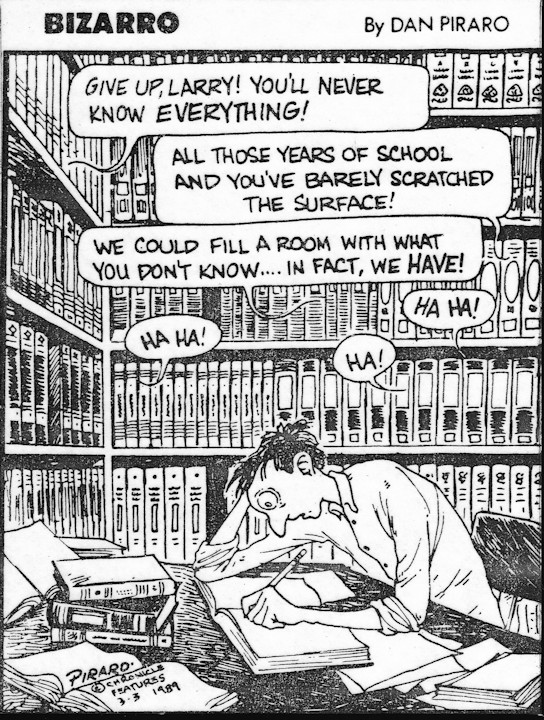![]()
 The past couple of weeks I have been trying to turn my office (one of our spare bedrooms, once upon a time) back into my office. A working space I’ll need when Susan retires this winter. My man cave, so to speak.
The past couple of weeks I have been trying to turn my office (one of our spare bedrooms, once upon a time) back into my office. A working space I’ll need when Susan retires this winter. My man cave, so to speak.
Over the past few years, since I sold the store and went back to home-based freelance work, I have spread my tools and toys around the house, an inexorable sprawl, rather like moss overtaking a pathway. Books litter the house, while my office became more of a walk-in storage closet. Until you could no longer walk into it and it was more like a squeeze-into space.
I’m not so much a hoarder as restlessly obsessed with learning and as a result I accumulate along the way . I simply can’t stop learning, can’t stop exploring the intellectual horizon. Which means I’m always chasing information, data, images, content. And saving it to read later. Which all too often doesn’t happen because I’ve moved on to some new subject of interest, like a magpie distracted by some shiny bauble.
The detritus of my previous efforts and explorations pile up, collecting dust. Thousands of printed pages, collected in binders or bound in Cerlox, each one a silent monument to some pursuit or learning experience I engaged in. Plus hundreds of pages on municipal agendas, reports, emails, notices, Municipal World magazines…
It was time to let go. To admit that I simply won’t go back to that place and space again. To make new space for new purposes. De-clutter. All those lovely platitudes and euphemisms.
It’s been a slow, agonizing and emotional process. Physically, it was like one of those wooden puzzles where you have just so many pieces and they have to assemble into a particular shape. The room is small – really a kid’s bedroom, not something for an adult with eclectic tastes. And I have stuff. Lots of stuff. So what to keep and what to let go takes some time and consideration.
Who knew I had so many guitars and ukuleles? Fourteen ukes, four guitars, one bass. And cases. And harmonicas. Flutes. Stands, microphones, cables, amplifiers, effects, Tibetan singing bowls… stuff I mostly want to keep. I will sell off some, but will keep many. Where will even my soon-to-be diminished collection reside?
Creating space means discarding other stuff; stuff that had – or even has – meaning to me; stuff that I gathered for a particular voyage into knowledge or experience.
 My unused “office” became cluttered with musical instruments, mounds of paperwork, magazines, books, computer accessories and parts, the DVDs Susan won’t watch (all those lovely B-flick collections I’ve acquired…) and stacks of stuff printed from internet pages and files, and bound with Cerlox or organized on three-ring binders for my later reading. Which often never came, or came sporadically. They became archive material. Reference material I seldom referenced after the first encounter, but was loathe to part with.
My unused “office” became cluttered with musical instruments, mounds of paperwork, magazines, books, computer accessories and parts, the DVDs Susan won’t watch (all those lovely B-flick collections I’ve acquired…) and stacks of stuff printed from internet pages and files, and bound with Cerlox or organized on three-ring binders for my later reading. Which often never came, or came sporadically. They became archive material. Reference material I seldom referenced after the first encounter, but was loathe to part with.
Meanwhile, needing more space to sprawl into, I moved my workspace and computers downstairs.
I bought more bookcases. Filled the house with them. They filled up and quickly overflowed. Mostly with books, but a few shelves held those fat binders and Cerlox-bound archives, too. Space was at a premium. The floor took piles of stuff the shelves could no longer hold. The house creaked and groaned under the weight.
And it’s not like the other bookcases in the house weren’t already filled to overflowing. Books stacked two deep on shelves, piled on floors, collected in every room.
I suspect at times I suffer from bibliomania. There are worse conditions, I suspect, but I do love my books. Not for collecting, but for reading, of course. It’s hard to express the simple yet deep delight I get from reading. I suppose we all do to some degree – not to love books, not to read for pleasure seems to me to be not quite fully human. I just love them more than most. Folks at Amazon smile when I sign on.
 Emotionally it’s tough to part with some of this stuff. I have to accept that I cannot learn everything, let alone keep it.
Emotionally it’s tough to part with some of this stuff. I have to accept that I cannot learn everything, let alone keep it.
Giacomomo Casanova (one of my cultural heroes) once wrote (to paraphrase): “No one can know everything, but everyone should try to.” Accepting that I cannot learn a thing, regardless of how eccentric or difficult it is, is to me an acknowledgement of failure. Knowledge is a challenge I seldom refuse.
I want to learn, to know everything. Which is completely impossible. No one can know everything, not even a fraction thereof. But still I want to try. I have a profound curiosity about everything. But I haven’t quite the dedication to bend all my resources to study just one thing, to master it then move on to the next. I flit back and forth, gobbling bits here and there.
I’m not sure there’s even a proper name for that obsession. I’ve read epistemophilic, sophophilic, philomath and gnosiophile. The suffix “-phile” means one who loves. One who obsesses should really have a “-holic” suffix (-aholic or -oholic): epistemohilic, sophoholic, philoholic and gnosioholic.
Words (another of my obsessions) aside, time isn’t on my side. Nor is my budget. I can no longer afford to buy just any book that intrigues me or pursue topics simply because they arose from some other interest. I cannot afford to print hundreds of pages from internet sources, and have them bound. I need to be selective. Plus, I’ve run out of space and She Who Must Be Obeyed says no more.
But also, at my age learning takes more effort. I can no longer recall with the ease I did 20 years ago. My memory is good, but the years have dulled it from its former sharpness. I sometimes have to re-read a paragraph or page; no longer is it easily absorbed and recollected after. That’s bothersome: I don’t think of myself as old, but the reality says otherwise.
I really wanted to learn to read Egyptian hieroglyphs. And Latin. Tibetan. Spanish. To be a chess master. To understand the Gnostics. To understand the gene machine. To learn virology. To make sense of Seneca and Cicero. To code in PHP. To read the works Shakespeare used as sources. To master music theory. To read Chaucer in the original.
And I gathered the tools to learn them all, and more. I started on each one. I memorized the symbols, practiced sentences, did the exercises and wrote simple programs. I read The Miller’s Tale in Middle English. I conjugated Spanish verbs.
But I never mastered any of them, never ventured much beyond a modest lay appreciation. Enough to whet my appetite, not enough to carry on a cocktail hour conversation among the cognoscenti.
So now I need to sort them out and dispose of a lot of it. Whittle down the piles, clear the shelves. Decide my priorities. And that’s not easy.
Just pulling a binder from a shelf and looking into it makes me want to try learning Egyptian hieroglyphics again, to slowly parse through a line and make sense of the little pictures. Or quote from a Sumerian myth or a Chinese poet. Solve a few three or four move chess problem in my head. Read an alternate translation of the Gospel of Thomas or the Epic of Gilgamesh. And what about my goals to learn Hebrew and Greek?
I soldier on. The pile for recycling grows, and the shelves clear like the land when the glaciers retreated. Susan smiles at the appearance of carpet like the sun after a rainstorm.
Still, I hesitate when it comes to those lessons about reading Chaucer. Maybe I’ll hang onto them just a little longer. Keep them with me through the winter and make my decision in the spring when I can sit on the deck with them one last time, parse my way through another tale, another poem. Chaucer is, after all, one of those literary icons whose presence has been long a part of my life. Like Shakespeare. Edgar Rice Burroughs. Jack Kerouac. Rudyard Kipling.
Or maybe Susan will catch me thumbing through them and take them off my hands, taking the decision away.
I suppose I ought to look on this as a process, another step along the journey, not a loss. There will be other things to read, other areas to explore; the horizon will always loom. Besides, who needs more paper?
And there has been some surprising delight: I’ve come across documents and photographs I had “filed” away and forgotten. Photographs of my motorcycles, trips, Susan, tequila tours, ferrets… little gems uncovered in the process of extracting the rest.
That photo at the top of the Cerloxed items bound for the recycling bin says it all: reprinted books of chess problems, from the 19th and early 20th centuries. A website on learning Latin, and a 19th century Latin textbook. Lessons on playing the shakuhachi with instructions on how to make one. Things that mattered a lot more some time ago than they do now. And I suppose things I can always find online again, should my wandering attention guide me that way.
I’ve always felt that the moment you stop learning, you start dying. Not physically: mentally, but the body will soon follow the mind once you start fossilizing. The world is full of people who are intellectually dead. People whose knowledge and opinions ossified, often at an early age, and they are resistant to new ideas, new learning. People who cannot expand their intellectual horizons because their minds are set in the cement of ideology. Like our council.
Marc Anthony, in Shakespeare’s Anthony and Cleopatra says,
we bring forth weeds,/When our quick minds lie still…
I am yet an able gardener, weeding away, still trying to be open to learning and new experiences. How long that will last, I cannot predict. But as long as I draw breath, I hope I can engage my curiosity and continue to learn. In the meantime, I continue to cull the material in my room to make space for the next phase.
And now to return to my room and continue sorting and selecting in order to be ready for Susan’s retirement.



The top image: left to right: Martin TK1 tenor, Fluke tenor, Yamaha Guitalele (GL1), Vorson steel-stringed electric tenor uke (black), on floor: Kala red cedar tenor, behind bass: Lyra mahogany baritone (1960s), Epiphone Viola bass, Goldtone tenor guitar TG18, Pono mahogany baritone uke, Tom Guy cigar box tenor uke (in front), Risa tenor electric (rear), Goldtone baritone banjo uke, Boat paddle tenor, Kala 8-string tenor, Godin tenor, Yamaha travel guitar, Kanilea Islander short-scale guitar, Kamaka long-neck. Contact me if you’re interested in buying any of these.